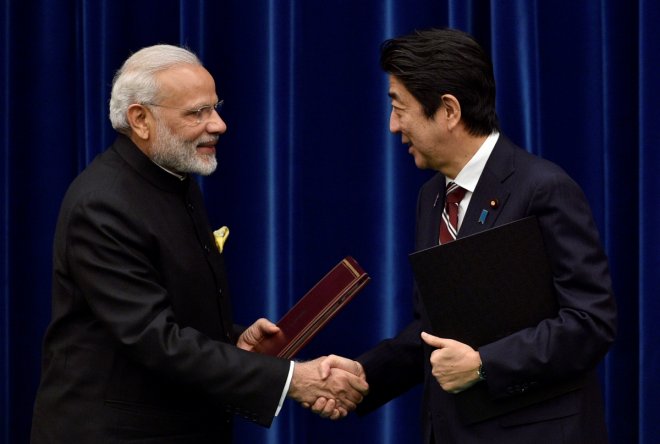
After six-year-long negotiations, India and Japan have signed a nuclear agreement under which Tokyo will export nuclear power equipment and technology to India.
Indian Prime Minister Narendra Modi and Japanese counterpart Shinzo Abe signed the deal during the annual India-Japan Bilateral Summit in Tokyo on Friday.
"Signing of Agreement for Cooperation in Peaceful Uses of Nuclear Energy is a historic step in our engagement for a clean energy partnership," Modi said.
The irony was obvious -- Japan has always been anti-proliferation, a stance which was buttressed by the Fukushima nuclear disaster in 2011.
"The agreement is a legal framework to ensure India acts responsibly for the peaceful use of nuclear energy," Abe said.
The deal was termed controversial by global media. Why does the 'controversial' label stick to the deal? Here are the six key points:
1. India has similar nuclear deals with the United States, France and Australia. But it has now become the first country which hasn't signed the Non-Proliferation Treaty to have clinched a civil nuclear deal with Japan, which suffered the worst consequences of nuclear weapons. Sections in Japan have always been highly critical of Tokyo making available nuclear technology to India, saying such a transfer of technology and material could help boost India's nuclear weapons programme.
2. Anti-proliferation campaigners say approving nuclear trade with India is a geo-strategic decision to support further nuclear weapons proliferation in Asia. "There is no effective separation between India's nuclear energy programme and its weapons programme, and the Japanese government's agreement conditions are meaningless," Greenpeace Japan said. The women of Fukushima also was in the forefront of the protest against a nuclear deal with India. "Nuclear power plants will not bring happiness to your citizens," the group told Modi in an open letter.
3. The Coalition for Nuclear Disarmament and Peace (CNDP) said the Indo-Japanese nuclear deal would fuel the nuclear arms race in South Asia where the tension between nuclear armed India and Pakistan is at a high point already. CNDP said the deal will help India free up its uranium supplies for military use and that it will give the "final seal of legitimacy for India's nuclear weapons".
-- However, under the terms of the deal, though India is allowed to reprocess fuel and enrich uranium, the processing of highly enriched uranium to a level where it can be used to make nuclear weapons is not permitted without written agreement by Japan.
-- The civil nuclear deal is limited to peaceful commercial use, India and Japan say. The deal also stipulates that Japan can terminate it if India conducts a nuclear test.
4. The deal with Japan was critical for India after it stitched up similar deals with other countries, starting with the US, which was the equivalent to breaking the great barrier before India as a nuclear pariah. Following this deal India made a headway in nuclear energy, commissioning reactors from Areva and Toshiba-Westinghouse. However, without striking a nuclear deal with Japan these wouldn't be operational as they need Japanese components.
5. Business friendly Abe has been under pressure to export more nuclear power plants to offset falling demand at home after the 2011 Fukushima nuclear disaster that set off huge public upheaval against nuclear energy in Japan. While for Japan this is about business, for India it's about meeting its energy needs.
6. Beyond that, this deal is about containing China and posing a joint effort in limiting the super power's sphere of influence. India sees China nervously, having had to engage the bigger neighbor in a risky tussle at the border in 2014. Japan too has the burden of history against China and overlapping claims in the East China Sea. Besides, China's rising belligerence over South China Sea is also matter of concern to Japan.
-- For India this is a diplomatic win over China after Beijing blocked India's entry into the Nuclear Suppliers Group (NSG) and, more importantly, won over nuetral countries like New Zealand to its side of the argument.








